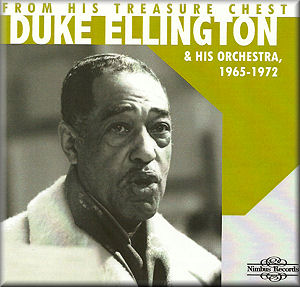1 The Old Circus Train
2. Swamp Goo
3. Trombone Buster
4. Bourbon Street Jingling Jollies
5. Mellow Ditty
6. To Know You is to Love You
7. Naidni Remmus
8. The Prowling Cat
9. Maiera
10. Thanks for the Beautiful Land
11. Charpoy
12. Portrait of Louis Armstrong
13. Girdle Hurdle
14. Sans Snyphelle
15. Woods
Collective personnel
Duke Ellington, Jimmy Jones - Piano
Cat Anderson, Cootie Williams, Ray Nance, Herbie Jones, Mercer Ellington,
Nat Adderley, Allen Smith, Fred Stone, Nelson Williams, Money Johnson,
Al Rubin, Richard Williams, Eddie Preston - Trumpets
Lawrence Brown, Buster Cooper, Chuck Connors, Booty Wood, Malcolm
Taylor - Trombones
Johnny Hodges, Russell Procope, Paul Gonsalves, Jimmy Hamilton, Harry
Carney, Norris Turney, Harold Ashby, Buddy Pearson, Harold Minerve
- Reeds
John Lamb, Joe Benjamin - Bass
Sam Woodyard, Louie Bellson, Chris Columbus, Rufus Jones - Drums
Wild Bill Davis - Organ
Tony Watkins - Vocals
My extensive collection of Duke Ellington albums includes a set of
ten CDs entitled The Private Collection. These come from what
the Duke called his "stockpile", assembled from recordings
he made with his band in-between concerts or when they were otherwise
unemployed. Ellington himself paid for these recordings to be made
- not necessarily to be issued to the public but so that he could
at least hear what his (and Billy Strayhorn's) compositions and arrangements
sounded like.
This new CD contains 15 such recordings made between 1965 and 1972.
They are said to be "previously unissued" but they were
actually first released in 1991 by the MusicMasters label. Nevertheless,
Duke's "stockpile" is a treasure chest that is well worth
opening and exploring. The band sounds relaxed, as they have no audience
to please and are playing primarily for their own - and Elington's
- pleasure. Many of the recordings date from the last years of Ellington's
life (he died in 1974) but they show little sign of diminishing powers.
In these years, the Duke was not only involved with his Sacred Concerts
but he also produced such masterpieces as And His Mother Called
Him Bill, The Far East Suite and The New Orleans Suite.
Indeed, Bourbon Street Jingling Jollies is the opening number
from the suite picturing New Orleans. Norris Turney is featured here
on flute, an instrument which Ellington regarded as inferior to the
clarinet - although this preference is understandable, as his band
included such prodigious clarinettists as Barney Bigard and Jimmy
Hamilton. The latter's brilliance is displayed at high speed on Girdle
Hurdle.
Jimmy Hamilton actually plays a tenor-sax solo on the CD's opening
track - The Old Circus Train, the latest in a number of Ducal
tunes portraying locomotives. It chugs along smoothly, with Hamilton
sounding like Ben Webster but also rather like a tenor version of
Johnny Hodges.
Swamp Goo is a mysterious jungle-style piece fronted by three
clarinets, with Russell Procope adding his name to the list of great
Ellingtonian clarinet soloists. Cat Anderson wrote Trombone Buster
for trombonist Buster Cooper, who makes the most of its flag-waving
potential. Mellow Ditty spotlights the bandleader's piano and
Cootie Williams' trumpet.
Ellington is the sole accompanist for singer Tony Watkins in To
Know You is to Love You - and it must be said that Duke's accompaniment
is much more enticing than Watkins' fairly ordinary vocals. Organist
Wild Bill Davis joins the band for Naidni Remmus (reverse each
word for the origin of the melody) and several other numbers. Adding
Davis's thick sound on Hammond organ to a big band was a daring move,
but it works surprisingly well. Paul Gonsalves solos soulfully here.
Davis composed this tune and Sans Snyphelle, which shuffles
along with solos from Harold Ashby (almost as breathy as Ben Webster)
and a muted but outspoken Cootie Williams. Wild Bill Davis is also
present on Charpoy, written by Billy Strayhorn and expressing
the laid-back atmosphere of India. This recording was made in 1970
- three years after Strayhorn's death.
The Prowling Cat was clearly written to feature trumpeter
Cat Anderson, whose high notes may have impressed audiences but leave
me dissatisfied that they so often fail to reach their obvious target.
Flugelhorn player Fred Stone shows a similar approximation to notes
in Maiera. Thanks for the Beautiful Land and Portrait of
Louis Armstrong are two more pieces from The New Orleans Suite,
with Norris Turney's swirling tenor sax prominent in the former and
Cootie Williams almost overwhelmed by the disappointingly poor recording
of the latter.
The final track, Woods, slims down the band to the rhythm
section plus trumpeter Money Johnson and a six-piece reed section,
although they manage to sound as full as a big band. Johnson's plunger-muted
trumpet takes us back to the early Ellington era and Bubber Miley's
similar style.
With the reservations mentioned, this is a cherishable set of lesser-known
recordings which add to the already overwhelming evidence of the Duke's
brilliance.
Tony Augarde
